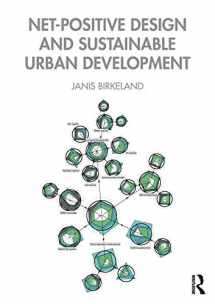
Net-Positive Design and Sustainable Urban Development
Book details
Summary
Description
'Sustainable' urban planning, policy and design professes to solve sustainability problems, but often depletes and degrades ever more resources and ecosystems and concentrates wealth and concretize social disparities. Positive Development theory holds that development could create more net ecological and social gains than no construction at all. It explains how existing conceptual, physical and institutional structures are inherently biased against the preservation and expansion of social and natural life-support systems, and proposes explicit reforms to planning, design and decision making that would enable development to increase future options and social and natural life-support systems - in absolute terms.
Net-Positive Design and Sustainable Urban Development is aimed at students, academics, professionals and sustainability advocates who wonder why existing approaches have been ineffective. It explains how to reform the anti-ecological biases in our current frameworks of environmental governance, planning, decision making and design - and suggests how to make these changes. Cities can increase both the 'public estate' (reduce social stratification, inequity and other causes of conflict, increase environmental quality, wellbeing and access to basic needs, etc.); and the 'ecological base' (sequester more carbon and produce more energy than used during construction and operation, increase ecological space to support ecological carrying capacity, ecosystem functions and services, restore the bioregions and wilderness, etc.). No small task, this new book provides academic theory and professional tools for saving the planet, including a free computer app for net-positive design.


We would LOVE it if you could help us and other readers by reviewing the book
Book review



